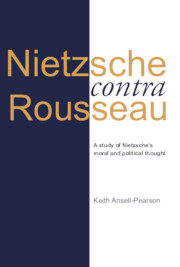Book contents
- Frontmatter
- Contents
- Preface
- Note on the texts and list of abbreviations
- Introduction
- 1 Nietzsche contra Rousseau
- 2 Civilization and its discontents: Rousseau on man's natural goodness
- 3 Squaring the circle: Rousseau on the General Will
- 4 Nietzsche's Dionysian drama on the destiny of the soul: on the ‘Genealogy of Morals’
- 5 Zarathustra's descent: on a teaching of redemption
- 6 Bending the bow: great politics, or, the problem of the legislator
- Conclusion
- Notes
- Bibliography
- Index
6 - Bending the bow: great politics, or, the problem of the legislator
Published online by Cambridge University Press: 03 May 2011
- Frontmatter
- Contents
- Preface
- Note on the texts and list of abbreviations
- Introduction
- 1 Nietzsche contra Rousseau
- 2 Civilization and its discontents: Rousseau on man's natural goodness
- 3 Squaring the circle: Rousseau on the General Will
- 4 Nietzsche's Dionysian drama on the destiny of the soul: on the ‘Genealogy of Morals’
- 5 Zarathustra's descent: on a teaching of redemption
- 6 Bending the bow: great politics, or, the problem of the legislator
- Conclusion
- Notes
- Bibliography
- Index
Summary
Our conclusion, then, is that political society exists for the sake of noble actions, and not of living together.
Aristotle, The Politics, Book iiiGrant me from time to time – if there are divine goddesses in the realm of beyond good and evil – grant me the sight, but one glance of something perfect, wholly achieved, happy, mighty, triumphant, something still capable of arousing fear! Of a man who justifies man.
Nietzsche, On the Genealogy of Morals, i, 12Uncanny is human existence without a meaning: a buffoon could be fatal to it.
Nietzsche, Thus Spoke Zarathustra, Prologue.Recent years have seen the emergence of a number of important studies of Nietzsche's politics, a subject which for a long time attracted only the most superficial of attention and analysis. The question of Nietzsche's politics still remains a disquieting one however. In its cult of great leadership and contempt for the mass of humanity it is seen by many commentators to prefigure a fascist style of politics. The question has been raised as to what extent Nietzsche's overt, aristocratic politics necessarily and logically follow from his philosophy of power and his insights into the modern age, notably the event of the death of God and the advent of nihilism. Whatever politics one derives from Nietzsche's profound insights into the nature of the modern malaise, it is surely important to consider why Nietzsche himself drew the political conclusions and cultivated the political arguments that he did from his insights into the problem of civilization.
- Type
- Chapter
- Information
- Nietzsche contra RousseauA Study of Nietzsche's Moral and Political Thought, pp. 200 - 224Publisher: Cambridge University PressPrint publication year: 1991

